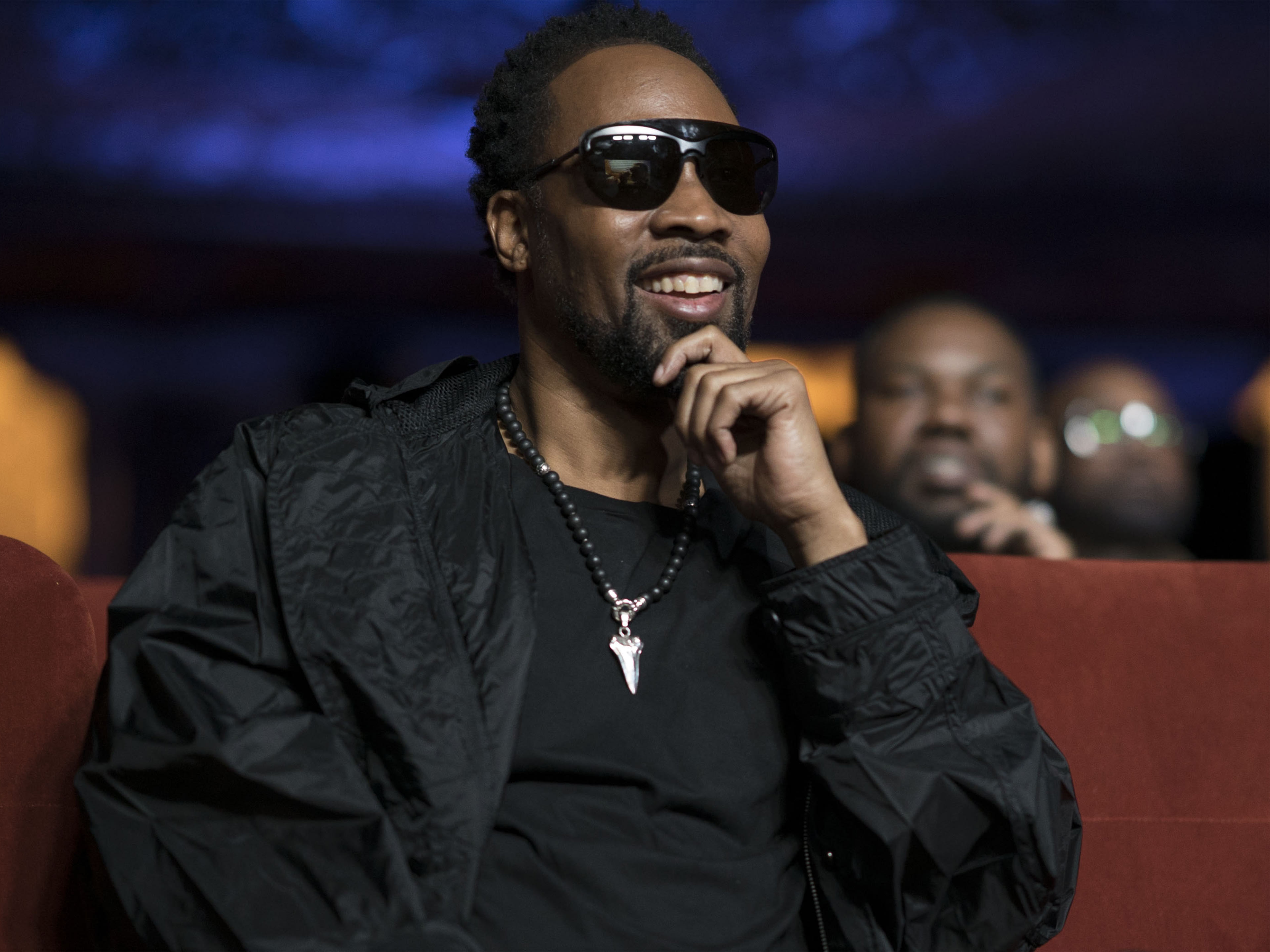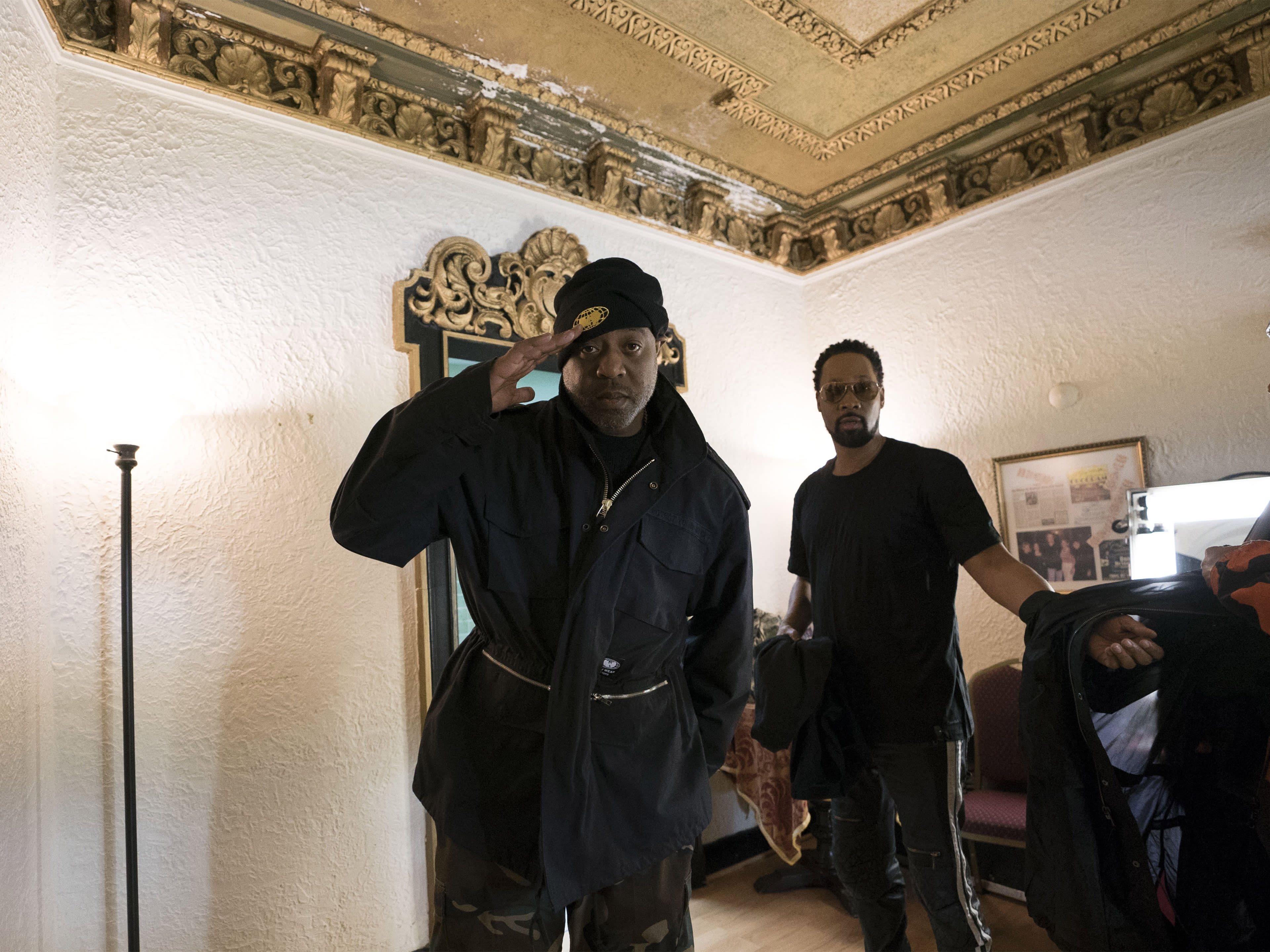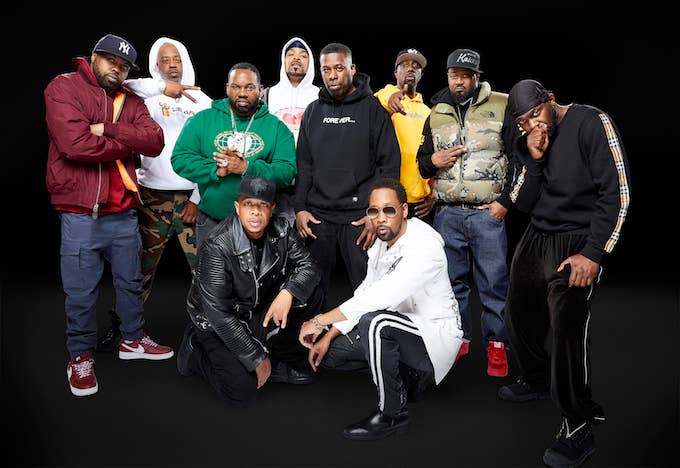
The Wu-Tang Clan’s vibrant and often tumultuous history has been chronicled extensively, but never as fully and with as much detail as in the new four-part documentary, Wu-Tang Clan: Of Mics and Men.
The Showtime series, directed by journalist-turned-filmmaker Sacha Jenkins, features new interviews with all of the surviving group members (plus RZA’s brother Divine, who has never previously spoken at length about his experience with the group). There are also reams of fascinating archival footage, including previously unseen material shot by GZA (“He never lets that footage go,” RZA says).
The film, Jenkins explains, demonstrates that the Wu’s music is their response to the environment they find themselves in. It’s an environment filled with structural racism and police violence—both when the group members were coming of age and, sadly, still today.
Just hours before the film’s the Tribeca Film Festival premiere in New York City on April 25, I met with Jenkins and the group, along with their longtime DJ and Wu logo creator Mathematics (true to the Wu’s fractious reputation, Raekwon, Method Man, GZA, and Ghostface weren’t present). I began by asking the crew about the film’s treatment of the killing of Ernest “Case” Sayon, an African-American man from Staten Island, friendly with many of the Clan members, who died in 1994 after being beaten by police. We also spoke about seeing your past onscreen, the influence of Some Kind of Monster, and why the Wu decided to let this warts-and-all portrait happen.
The interview below is edited and combined from two separate conversations.
Why was it important to dedicate a section of the film to Ernest “Case” Sayon?
RZA: Well, that's still going on. People don't pay attention. You would think that there would be a change in our community, or change in the landscape of the world of police killing young black men and not getting no criminal charge for it. And then years later, the same thing.
Sacha Jenkins: I wanted to make a film that gave people a real view of the blues. You know, that's what Wu-Tang's music is. That's what black music is in America. Any form of black music in America is essentially the blues. It is our way of reacting to our environment. And so, Ernest Sayon was someone who is a contemporary, a friend of the Wu-Tang guys growing up in Staten Island. When you go back and look at what happened to him, which is the point I was trying to make, it's happening now. So many people know and love Wu-Tang, but I wanted people to understand all the things that they had to endure. What they faced is what young black men and women face today. And so, it was a prominent case that was directly connected to the group as they were ascending, as their fame was starting to happen.
U-God’s son unfortunately was shot [in 1994]. We have the footage of his son watching the group on Arsenio Hall talking about it, and then we have the footage of U-God holding his son, cursing. His son says, "Daddy, why are you cursing?" He says, “Because I’m stressed.” Then his son says, "No, Daddy. I'm stressed.” That's a two-year-old kid. What if a white two-year-old kid said that? What if Miley Cyrus was two years old and she got shot and Billy Ray was holding her in a trailer park somewhere? How would America react to that? They wouldn't. And so the music that these guys made was their reaction to what we were facing.
“I wanted people to see the brotherhood. I wanted people to see the magic.” - sacha Jenkins
The film draws parallels between Case and Eric Garner.
RZA: Yeah. It's the same thing. The same choke hold. And then when you think about it, we come from the generation where there was a movie, Do the Right Thing, that shows you the same thing. And it's like when a problem or sickness exist in your body—it has to always be examined. You can't wish it away.
RZA, Of Mics and Men deals with your arrest and trial for attempted murder in Ohio in the early 1990s. Did you have any reservations about including that?
RZA: Yeah. I was uncomfortable. Listen, there's a lot of uncomfortable parts of this documentary for me. Might as well say that out front. But at the same time, we allowed Sacha and his team to put that light on it.
Being who we are, we could have said, “Yo, take that out.” But, at the end of the day, it's like our music: it's objective, it's art, it is what it is. Let it exist and let the world see it and decide, decipher for themselves. I won't agree with some of it. The most beautiful thing I get from this documentary is that everybody has a perception of it. When I see some things that I disagree with, I respect that, you know what, that's how he saw it. And it's hard. But I didn't raise my voice to veto nothing in that documentary.
When you were talking about ODB in the doc, you said, "We're the dream itself," meaning that you two were the nucleus of the group. The footage of him goes from 1991 all the way to the end of his life. What was it like looking at all the stuff about Dirty?
RZA: Yeah. That was also very sad and morbid. It was very painful to watch it. You have joy and pain that's happening. You get the joy of him and his energy. And then, the documentary goes and shows the fat Dirty, when Roc-A-Fella had him [Dirty signed to Roc-A-Fella in 2003, after coming out of prison]. I always felt like they never treated [him] the way he was supposed to be treated.

The movie's not kind to Roc-A-Fella.
RZA: No. They never treated him the way he's supposed to be treated. Even a diamond when it comes out of the ground, it's just a rock to be polished, and then cleaned and cut right. When he came out the system they were just like, “No, let's just move him here.” When you watch it, for me it was hard. It was a joy to see my brother. And they got stuff in there that none of us had ever seen in the film, because they had a camera following him. [Dirty was being filmed at the time for a never-completed VH1 reality show, though some footage showed up in a documentary the channel aired]. They was doing something that he didn't know they was doing. Reality shows wasn't real yet like that. He became the first experiment of a reality show, and he didn't know that.
So he's sitting there talking and explaining what's on his mind, and he's being influenced to talk. There's one scene in there where he says, “RZA won't let me out my contract. What the fuck you doing?” He was cursing on camera. And then Jarred [Weisfeld, Dirty’s then-manager] just throws a pin there: “What, RZA wants money?”
I'm never going to ask my cousin for no money or nothing like that. Out of anybody, I feel he is not supposed to leave Wu-Tang Production because this is our dreams. I'm brought back to laying in bed at 12 years old looking up and dreaming. It's just me and this guy. It ain't all of us.
“roc-a-fella never treated [dirty] like he's supposed to be treated.” - Rza
He was your beatbox.
RZA: Yeah. So that was the dynamic of my emotion. But it was interesting to see how he felt. And whether it was from peer motivation—whether it was how he felt or whether he was being [influenced], it was interesting to hear it.
U-God, in Episode 1, you and Ghost talk about depression and post traumatic stress that you faced growing up.
U-God: You know the thing about being black? You can't put your guard down for shit, man. You’re on the defensive all the time, and I don't think that white America understands that. Until all the shootings going on and the situations and the Columbine and all that—now they get a taste of what we go through every day. It's hard to explain. The film covers that. It puts a microscope on certain situations.
Mathematics: As soon as you let your guard down, that's when it happens. When you think it can't happen, that's when it happens.
U-God: And that's post traumatic stress, when you're on the constant defense. From shell bombing, whatever. Just constantly being under surveillance and attacked. We been like that since we was kids. You don't even know you got that mechanism on you. When we walk outside in the ghetto you gotta be on point, man. You gotta be ready to rumble.
Cappadonna: Ever since we was kids, one thing that we had to deal with was our hood just being so rough and adverse. At the same time, we still have to worry about the economic and educational system making us feel inferior. You know, white supremacy is something that we had to face at school. We used to have riots in the high schools on Staten Island back in the day. All of that still plays a role in how we are viewed today. So when we go to get jobs or just go to get hotel rooms, we're always being questioned. We need extra ID and stuff like that. That's just stuff that piles stress on us, along with various levels of oppression. Sometimes we still get denied, even with the qualifications.

Sacha: And to add on to what he’s saying, when he recounts [in the film] being on the school bus seeing, “Kill all n*ggers KKK,” on a train trestle, you'll notice that he says it with a laugh. Whenever these guys talk about something really traumatic, there's a laugh afterwards. To me, that is also how music has always been. Art has been a way for us to deal with this oppression. These are things that I didn't really realize going into it. Why is there a laugh? Because it's the only way we've been able to process and deal and survive—dealing with what we've had to deal with.
What was it like putting together a film where the subjects are also producers?
Sacha: You know, that question keeps coming up and my answer goes back to, how did you get Divine? RZA made the call, and in that capacity, the group was kind enough to introduce us to friends and family, and give us access to personal effects and things that most people wouldn't have access to. Other than that, as you can see, they've only seen the first two episodes. RZA will tell you himself, they left me the hell alone. I made the film that I wanted to make.
He said, "You know what? I don't agree with everything that was said, but what I like about this is you are fair and even, and every guy in the group had their opportunity to speak their mind. I think that's why this film is important." So, going back to my journalism, I wanted to make sure everyone had a fair shot; and going back to my journalism, I knew journalists would ask me this very question.
For the group interview scenes, everyone’s together in a movie theater. Why?
Sacha: How do you wrangle a bunch of cats? So, I'm a fan of the film Cooley High and there's a famous scene where there's a bunch of ruckus in a movie theater. But also, Metallica has a film called Some Kind of Monster, where all the guys were together dealing with themselves and their issues. I got all of them together and showed them moments from their lives and their careers; it's in the moment and it's happening, and they're together. I wanted people to see the brotherhood. I wanted people to see the magic. And in watching them together, the information just in the body language gives you everything. As U-God says, I think in the last episode: "Look, we've been through some shit. Shit's fucked up, but this is my family.”
“YOU KNOW THE THING ABOUT BEING BLACK? YOU CAN'T PUT YOUR GUARD DOWN FOR SH*T, MAN.” - U-GOD
What was it like for you guys seeing footage of yourselves from over twenty years ago?
U-God: For the most part, looking at myself and looking at now, the younger Uey made the right decision. And I met a lot of fucked up positions growing up, because we didn't have male figures to say, "Yo, should I pop that motherfucker dead? Or should I leave him alone?" We ain’t had that shoulder to lean on.
Mathematics: We had the older Gods [members of the Nation of Gods and Earths].
U-God: You had that. I didn't. We didn't have that. We was out there runnin', bullet-proof vests on, guns. That guy was a Neanderthal, right there. That guy was a maniac. But we recovered from that and became law-abiding citizens.
Cappadonna:Love, went through hell, and came out right.
U- God: It just made me want to see more. We could do another one of these movies.
There is relatively little about specific songs in the film, but you devote a lot of time to “C.R.E.A.M.” Why that song?
Sacha: I think so many people just have such a connection to the storytelling. What Raekwon says about his personal life in that song, when you really pay attention to it, he's so open and honest. That registered with a lot of people. The aspirational aspect of “C.R.E.A.M.” was something that's universal. It speaks to the idea of wanting to get out, wanting to change your situation, detailing what you're going through and talking about how cash is relative to that, and how cash can hurt you or help you. All of that is wrapped up in that song.
U-God: That song is the soundtrack to our life.
Cappadonna: The soundtrack to the black community's life, too.
U-God: “Handcuffed in the back of the bus, forty of us,” and all of that. “Life as a shorty shouldn't be so rough.”
Cappadonna: “Moms bounced on old man.” Everybody know the separation in the family structure. You know, it's rough. Sometimes I been sitting back like, America don't give a fuck about us. At the end of the day, they know what's going on in our situation.
That's one of the themes of the film.
Cappadonna: Yeah. Nobody wants to be in our condition, but we talking about this shit, and we're letting you know some real shit. Letting y'all know what the fuck is going on in our subculture, because this is like a subculture.
Sacha: Deck is a great writer, but it’s a simple line: “Life as a shorty shouldn't be so rough.”
The film opens up with this guy talking about his ponds. There was our pond, and then there was the white boy pond. Throughout the film you see, going back to what [Cappadonna] said about when he goes shopping, he's got to have extra identification. These are things that are wrapped up into our minds, that we don't think about all the time, but they affect the way that we move. I wanted people to see a film that helped them to understand that.


